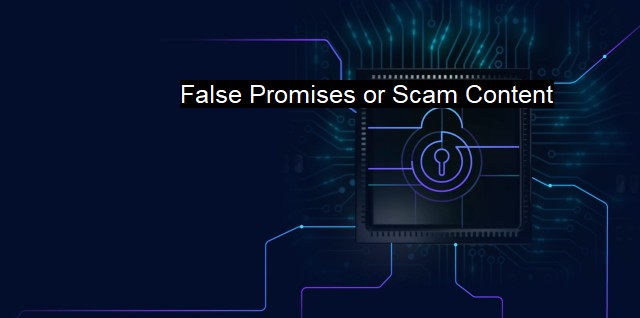What is False Promises or Scam Content?
Why False Promises and Scam Content are a Major Cybersecurity Threat in Today's Technological Landscape
In the digital age, with the worldwide reach of the Internet spreading far and wide, cybersecurity has garnered much attention. This attention has risen dramatically due to the increasing presence of hackers, cybercriminals, and scam artists seeking to exploit individuals and corporate entities for financial gain, disruption, or stolen information. One of the quintessential exploitative tactics they make use of is essentially known as "False Promises" or "Scam Content".False promises emanate from a cyber threat termed 'scam content'. This strategy involves online unscrupulous entities that entice unsuspecting victims with appealing propositions, which are largely deceptive and misleading. They promise lucrative benefits, irresistible deals, above-normal returns on investments, among other fake incentives. Victims, often enticed by the attractiveness of these offers, fall victim and, consequently, expose a vast amount of invaluable data, resulting in aspects like financial fraud, identity theft, or data theft.
To deepen our understanding of false promises and scam content, we need to dissect it into typical forms. One prevalent form in this digital era is the social engineering attacks or the act of tricking someone into divulging sensitive information. The predator seeks to manipulate individual's psychological tenets to cajole them into sharing confidential details. They exploit the victim's trust and weave a web of deceit marked by fake identities, manipulative stories or offers that persuade victims to do their bidding unknowingly.
Another characteristic aspect of false promises is phishing, which falls under the purview of social engineering attacks. Phishing is an online manipulation tactic where fraudulent information is cloaked as trustworthy. This could emerge in emails or instant messaging where users receive messages directing them to enter personal information on a fake website posing as a legitimate one. Thus, under the pretext of security or else a prize, users inadvertently hand over financial and personal credentials to these cybercriminals.
Though financial cons are common, other avenues such as scam software download prompts or malware-laden websites are also rampant. These fake websites may claim to provide free software or premium access with no cost, a practice often referred to as 'baitware.' Once users download these so-called free versions', the malicious software hidden within can infiltrate their computers or network systems, breaching user security immensely.
Given the volume and sophistication of these false promises and scam content, cybersecurity matches pace to ensure internet users' safety. Antivirus software plays a pivotal role as the first line of defense. These digital shields identify and exterminate threats like viruses, malware, and other potential harmful software ensuring data integrity and system safety. They are also becoming increasingly intelligent to notify users about phishing websites or emails, prompting an immediate response to protect critical information.
Cybersecurity best practices recommend continuous user awareness programs that serve to educate about fraudsters' tactics, including the concept of false promises. Users must be encouraged to verify any suspicious email or link, avoid downloading from non-reputable sources, ignore requests for personal information, and ensure a comprehensive and up-to-date antivirus is in place and regularly updated.
"False Promises" or "Scam Content" signify the deceitful tactics deployed by cyber criminals to exploit naive users, promising enticing offers only to defraud them. It can take numerous perceptions – an email, a pop-up, or a website to breach your information. with robust antivirus software and an informed understanding of potential pitfalls and cyber threats, one can remain safeguarded against such manipulative advances over the internet.

False Promises or Scam Content FAQs
How can I protect myself from false promises or scam content related to cybersecurity and antivirus?
You can protect yourself from false promises or scam content related to cybersecurity and antivirus by using reputable security software from trusted providers. It is also important to educate yourself on common online scams and stay vigilant when browsing the internet or opening emails.How can I identify false promises or scam content related to cybersecurity and antivirus?
False promises or scam content related to cybersecurity and antivirus can be identified by looking for red flags such as unsolicited emails, offers that seem too good to be true, or requests for personal information. Always take the time to research the company or product before making a purchase or providing any sensitive information.What should I do if I have been a victim of false promises or scam content related to cybersecurity and antivirus?
If you have been a victim of false promises or scam content related to cybersecurity and antivirus, you should immediately report it to your antivirus provider and the appropriate authorities. You should also change any passwords or account information that may have been compromised.Can false promises or scam content related to cybersecurity and antivirus harm my computer or steal my personal information?
Yes, false promises or scam content related to cybersecurity and antivirus can harm your computer or steal your personal information if you download malicious software or unknowingly provide your sensitive information to scammers. It is important to always exercise caution and use trusted security software to protect yourself online.| | A | | | B | | | C | | | D | | | E | | | F | | | G | | | H | | | I | | | J | | | K | | | L | | | M | |
| | N | | | O | | | P | | | Q | | | R | | | S | | | T | | | U | | | V | | | W | | | X | | | Y | | | Z | |
| | 1 | | | 2 | | | 3 | | | 4 | | | 7 | | | 8 | | |||||||